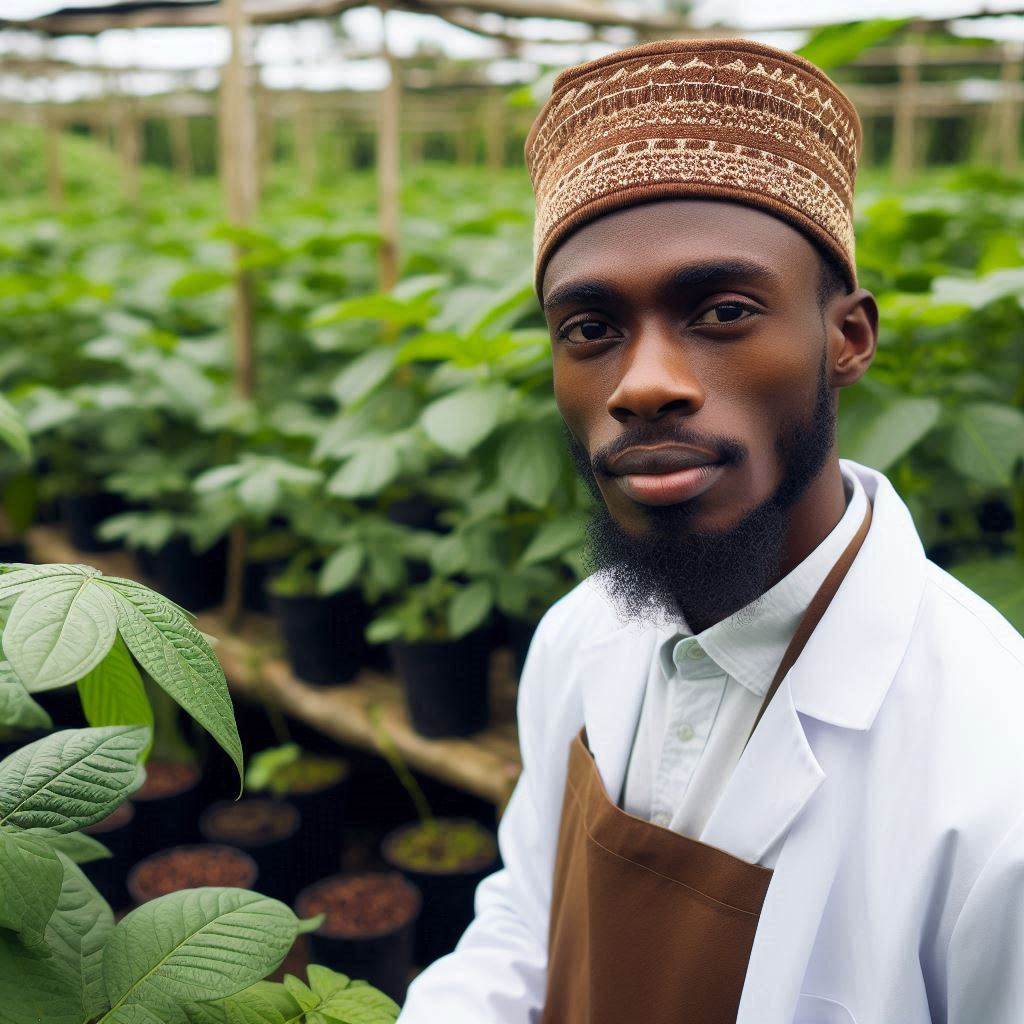Introduction
Seed science research stands at the forefront of Nigeria’s agricultural resurgence, pivotal in driving sustainable growth and ensuring food security. Over the years, the country has recognized the indispensable significance of seed science in advancing agricultural development.
In tracing the history of seed science research in Nigeria, we uncover a narrative rich with innovation and resilience. From humble beginnings to contemporary breakthroughs, the journey reflects a relentless pursuit of agricultural excellence.
Researchers and scientists have navigated challenges, adapting traditional knowledge with cutting-edge technologies to propel the sector forward.
As Nigeria grapples with the complexities of modern agriculture, seed science remains a beacon of hope. Its evolution mirrors the nation’s aspirations for a robust and resilient agricultural sector.
This introduction sets the stage for a comprehensive exploration of the latest advancements in seed science research, illuminating the path toward a prosperous agricultural future.
Current status of seed science research in Nigeria
Overview of key players, institutions, and initiatives in seed science research
- Key players in seed science research in Nigeria include universities, research institutes, and agricultural organizations.
- Notable institutions involved in seed science research are the National Horticultural Research Institute (NIHORT) and the Institute for Agricultural Research (IAR).
- Initiatives such as the National Agricultural Seeds Council (NASC) promote seed quality assurance and regulation in Nigeria.
Highlights of recent advancements and breakthroughs in the field
- Nigeria has made significant progress in developing high-quality seeds for crops like maize, rice, and wheat.
- Researchers have successfully bred new varieties of seeds that are resistant to pests and diseases, improving crop yields.
- New technologies, such as biotechnology and molecular breeding, are being utilized to enhance seed quality and productivity.
- Partnerships with international seed companies and organizations have helped Nigeria access advanced seed technologies and expertise.
Read: Horticultural Tools and Equipment in Nigeria
Challenges facing seed science research in Nigeria
In recent years, seed science research in Nigeria has witnessed significant growth, propelled by the concerted efforts of various stakeholders. Leading the charge are esteemed institutions and dedicated researchers committed to driving innovation in agriculture.
Key Players and Initiatives
Key players in seed science research include prominent universities such as Ahmadu Bello University, University of Ibadan, and Federal University of Agriculture, Abeokuta.
These institutions boast robust research facilities and esteemed faculty members dedicated to seed science advancements.
Moreover, governmental bodies like the National Agricultural Seeds Council (NASC) play a pivotal role in regulating and promoting seed quality standards nationwide. Their initiatives aim to ensure farmers have access to high-quality seeds, driving productivity and crop resilience.
Recent Advancements
Recent advancements in seed science research have focused on enhancing seed quality, resilience, and adaptability to diverse agroecological conditions.
Breakthroughs include the development of climate-smart seed varieties that withstand extreme weather events, disease-resistant hybrids, and biofortified seeds with enhanced nutritional profiles.
Additionally, research efforts have expanded to incorporate biotechnological tools such as molecular breeding techniques and genetic engineering.
These cutting-edge approaches accelerate the breeding process, facilitating the development of superior seed varieties with desired traits.
Challenges and Solutions
- Limited Funding and Resources for Research and Development: Despite progress, seed science research in Nigeria faces challenges related to limited funding and resources for research and development. Adequate investment is essential to sustain momentum and drive further innovation.
- Lack of Awareness and Adoption of Modern Seed Technologies by Farmers: Another challenge is the lack of awareness and adoption of modern seed technologies by farmers. Efforts to bridge this gap through extension services and farmer education programs are critical.
- Policy and Regulatory Issues Affecting the Seed Industry: Policy and regulatory issues affecting the seed industry pose additional challenges.
Streamlining regulations and creating an enabling environment for seed research and innovation can unlock the full potential of the sector.
Collaborative initiatives between research institutions, agricultural agencies, and private sector entities have further propelled seed science research forward.
Partnerships aim to leverage resources, expertise, and technology to address pressing agricultural challenges and foster sustainable development.
Basically, the current status of seed science research in Nigeria reflects a dynamic landscape characterized by innovation, collaboration, and progress.
With ongoing support and investment, the nation is poised to harness the transformative potential of seed science to drive agricultural productivity, food security, and economic growth.
Read: Overview of Horticulture in Nigeria
Opportunities for Growth and Innovation in Seed Science Research
Potential for Collaboration with International Organizations and Research Institutions
The field of seed science research in Nigeria holds significant opportunities for growth and innovation.
Collaborating with international organizations and research institutions can drive substantial progress. These partnerships can provide access to advanced technologies, funding, and expertise.
Collaborating with international organizations offers several advantages:
- Access to cutting-edge technologies.
- Enhanced funding opportunities.
- Knowledge exchange and capacity building.
- Joint research projects that address global and local challenges.
For instance, partnerships with institutions like the International Institute of Tropical Agriculture (IITA) have already yielded positive outcomes.
These collaborations can be expanded to include more specialized research and development initiatives.
Adoption of Biotechnology and Genetic Engineering for Crop Improvement
Adopting biotechnology and genetic engineering can revolutionize crop improvement efforts. These technologies allow for precise modifications, enhancing desirable traits such as yield, disease resistance, and nutritional content.
Nigeria can benefit immensely by integrating these modern techniques into its seed science research framework.
Biotechnology and genetic engineering offer transformative potential.
Genetic modification can introduce traits that improve crop resilience to pests, diseases, and extreme weather. This reduces the reliance on chemical inputs, promoting sustainable farming practices.
Additionally, biofortification through genetic engineering can address malnutrition by enhancing the nutritional content of staple crops.
Development of Improved Seed Varieties Suited to Nigeria’s Agro-Climatic Conditions
Developing improved seed varieties tailored to Nigeria’s diverse agro-climatic conditions is crucial. Such varieties can better withstand local environmental stresses, ensuring higher productivity and food security.
By focusing on region-specific needs, researchers can create seeds that thrive in various Nigerian climates and soils.
Developing seeds suited to Nigeria’s specific agro-climatic conditions requires a deep understanding of local environments. Researchers must consider factors such as
- Soil types.
- Rainfall patterns.
- Temperature ranges.
- Common pests and diseases.
This localized approach ensures that new seed varieties are not only high-yielding but also resilient and sustainable.
For example, drought-tolerant maize and disease-resistant cassava have shown promise in boosting agricultural productivity in challenging conditions.
To capitalize on these opportunities, Nigeria must
- Increase funding for seed science research.
- Foster collaborations with international and regional research bodies.
- Promote the adoption of modern biotechnology and genetic engineering techniques.
- Train and support local scientists and researchers.
Moreover, creating an enabling policy environment is essential. Government policies should support research and development, encourage public-private partnerships, and ensure that farmers have access to improved seeds.
By doing so, Nigeria can build a robust seed sector that drives agricultural growth and food security.
Generally, the future of seed science research in Nigeria is bright with immense opportunities for growth and innovation. Collaborating with international organizations, adopting biotechnology, and developing locally suited seed varieties will transform agriculture.
These efforts will enhance productivity, sustainability, and food security, ensuring a prosperous future for Nigerian agriculture.
Read: Scholarship and Funding Opportunities for Forestry Students in Nigeria

Impact of Seed Science Research on Agriculture and Food Security
- Contribution of improved seeds to increased crop yields and farm productivity
- Role of quality seeds in enhancing food security and nutrition for rural communities
- Potential for seed science research to drive sustainable agriculture and economic growth in Nigeria
Contribution of improved seeds to increased crop yields and farm productivity
Seed science research plays a crucial role in agriculture and food security in Nigeria. By developing and disseminating improved seeds, researchers have significantly contributed to increasing crop yields and farm productivity.
The adoption of quality seeds has not only boosted food security but also improved the nutritional status of rural communities across the country.
Additionally, seed science research has the potential to drive sustainable agriculture practices and stimulate economic growth in Nigeria.
Improved seeds are at the forefront of agricultural transformation in Nigeria.
Through the application of innovative breeding techniques and biotechnology, researchers have been able to develop high-yielding and resilient seed varieties tailored to local agro-ecological conditions.
These improved seeds have demonstrated remarkable performance in terms of increased crop yields, disease resistance, and tolerance to adverse weather conditions.
As a result, farmers have been able to achieve higher productivity levels and improve their livelihoods.
Role of quality seeds in enhancing food security and nutrition for rural communities
Quality seeds play a fundamental role in ensuring food security and nutrition for rural communities in Nigeria. Access to reliable seed sources enables farmers to produce sufficient quantities of nutritious food to meet the needs of their households and communities.
By planting high-quality seeds, farmers can improve the nutritional content of their crops, thus addressing malnutrition and related health issues among vulnerable populations.
Moreover, the use of quality seeds reduces the risk of crop failure, ensuring a stable food supply throughout the year.
Potential for seed science research to drive sustainable agriculture and economic growth in Nigeria
Seed science research has the potential to drive sustainable agriculture and economic growth in Nigeria.
By promoting the adoption of improved seed varieties and modern farming practices, researchers can help farmers transition towards more sustainable and environmentally friendly production systems.
This shift towards sustainable agriculture not only conserves natural resources but also enhances the resilience of farming communities in the face of climate change and volatile market conditions.
Furthermore, the increased productivity and profitability resulting from seed science research can contribute to overall economic development and poverty reduction in Nigeria.
Therefore, seed science research has a profound impact on agriculture and food security in Nigeria.
The contribution of improved seeds to increased crop yields and farm productivity, the role of quality seeds in enhancing food security and nutrition for rural communities, and the potential for seed science research to drive sustainable agriculture and economic growth highlight the importance of ongoing research efforts in this field.
By prioritizing seed science research and investing in seed technology, Nigeria can further strengthen its agricultural sector and ensure food security for its growing population.
Read: Field Work & Practical Training in Nigerian Forestry Schools
Conclusion
Summary of key points discussed in the blog post
Seed science research in Nigeria has seen significant advancements in recent years, with a focus on improving seed quality, production, and storage techniques.
Collaboration between researchers, farmers, and government agencies has led to the development of new seed varieties that are more resilient to pests, diseases, and climate change.
Investments in research infrastructure and training programs have also contributed to the growth of the seed science sector in the country.
Overall, the progress made in seed science research in Nigeria holds promise for enhancing food security, agricultural productivity, and sustainable development.
Call to action for stakeholders to invest in and support seed science research in Nigeria
Stakeholders, including policymakers, investors, and agricultural organizations, are encouraged to prioritize funding and resources for seed science research initiatives.
By investing in this critical area, stakeholders can help drive innovation, improve crop yields, and ensure the long-term sustainability of Nigeria’s agricultural sector.
Supporting seed science research will not only benefit farmers and consumers but also contribute to the overall economic development of the country.
Future outlook for the advancement of seed science research in the country
The future of seed science research in Nigeria is promising, with opportunities for further collaborations, technological advancements, and knowledge-sharing.
Continuous investment in research and development will be essential for addressing emerging challenges in agriculture and increasing the resilience of crops to changing environmental conditions.
With continued support and a commitment to innovation, Nigeria has the potential to become a leader in seed science research within the region and beyond.




